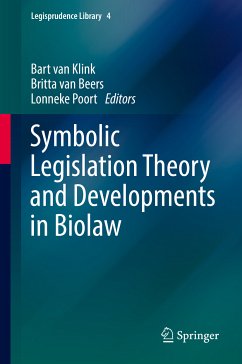Symbolic legislation has a bad name. It usually refers to instances of legislation which are ineffective and that serve other political and social goals than the goals officially stated. Recently, a more positive notion of symbolic legislation has emerged in legislative theory. From this perspective, symbolic legislation is regarded as a positive alternative to the more traditional, top-down legislative approach. The legislature no longer merely issues commands backed up with severe sanctions, as in instrumental legislation. Instead, lawmakers provide open and aspirational norms that are meant to change behavior not by means of threat, but indirectly, through debate and social interaction.
Since the 1990s, biomedical developments have revived discussions on symbolic legislation. One of the reasons is that biomedical legislation touches on deep-rooted, symbolic-cultural representations of the biological aspects of human life. Moreover, as it is often impossible to reach consensus on these controversial questions, legislators have sought alternative ways to develop legal frameworks. Consequently, communicative and interactive approaches to legislation are prominent within the governance of medical biotechnology.
The symbolic dimensions of biolaw are often overlooked. Yet, it is clear that the symbolic is at the heart of many legal-political debates on bioethical questions. Since the rise of biomedical technologies, human body materials have acquired a scientific, medical and even commercial value. These new approaches, which radically question existing legal symbolizations of the human body, raise the question whether and how the law should continue to reflect symbolic values and meanings. Moreover, how can we decide what these symbolic valuesare, given the fact that we live in a pluralistic society?
Dieser Download kann aus rechtlichen Gründen nur mit Rechnungsadresse in A, B, BG, CY, CZ, D, DK, EW, E, FIN, F, GR, HR, H, IRL, I, LT, L, LR, M, NL, PL, P, R, S, SLO, SK ausgeliefert werden.









